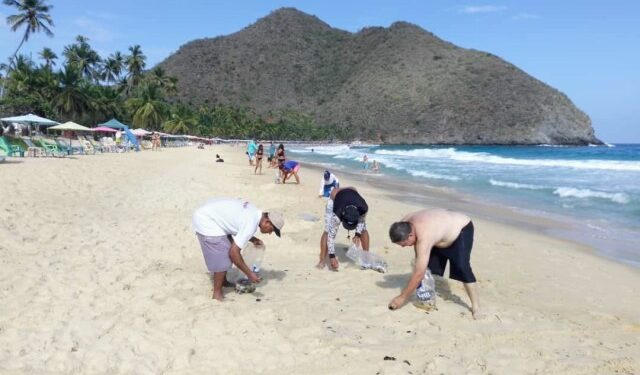Photo by Blue Environmentalists Foundation
On the paradisiacal Venezuelan coasts, the fight to preserve the marine ecosystem is increasingly gaining momentum, highlighting its importance and impact on the sustainability of the planet and the quality of life of the people.
By Marianny Castellanos // Correspondent lapatilla.com
Specifically on the coasts of Aragua in central Venezuela, where tar balls (oil) were recently found in small quantities, environmental concerns and its effects are a daily worry with other situations.
Beyond oil spills, which are occasional and attract media attention, a more persistent and damaging threat looms over these waters and often goes unnoticed.
To this end, the lapatilla.com team spoke with Gustavo Carrasquel, President of the ‘Azul Ambientalista’ an environmental Foundation, who highlighted that the pollution generated by the activity of human beings is at present a challenge for the preservation of marine and coastal ecosystems.
The harm of microplastics
Plastics become a big problem when they transform into micro-plastics
Tourism, although vital to the local economy, has also contributed to pollution. The lack of environmental awareness and inadequate waste management by visitors negatively impacts the beaches.
For this reason, the classification of “predatory tourism” comes to the fore as a concern for environmentalists and is evidence of the need for stricter regulation.
Cigarette butts, in addition to plastic and microplastics, are becoming more abundant every day on the country’s various beaches, harming various marine species.
In this sense, Carrasquel explained that plastics, although they are a more durable material, in the marine context they weaken faster due to the same climatic conditions.
“Plastics, although they are more durable, with the same erosion by sand, the sun and ultraviolet rays, fragment into smaller and smaller pieces until they become micro-plastic. “That does more damage, because it has already been incorporated into the food chain of both marine fauna and humans,” he noted.
The beach is not your ashtray
Cigarette butts and bottle caps are common polluting agents in the sand
Likewise, he highlighted the lack of awareness of visitors who leave “piles” of cigarette butts where they are sitting. For this reason, together with the Ministry of Tourism and the environmental brigades, they have been eliminating this waste from the beaches for three years and joining efforts in environmental education.
“There should be a law that makes waste removal mandatory. Here we have the collaboration of a recycling company, which donated us some stainless steel baskets with which you sift the sand and collect the waste. This allows us to remove the metal bottle caps, lollipop sticks and cigarette butts,” he said.
The environmental expert commented on the consequences of the unsustainable activity of tourism that leaves behind trash that create micro-plastic particles in sea salt and even in water.
In addition, sewage also emerges as another problem that deeply affects the ecosystem, as Carrasquel explained that there are streams that are fed by wastewater, which in turn carries garbage and plastics.
“In Choroní there is a human settlement towards the mountain, which has a poorly managed garbage dump. That landfill when it rains falls into the ravine, the ravine’s sludge ends up in the sea and carries enormous amounts of plastic,” explained the environmentalist.
Active response
Environmentalists participate in cleanup days
In Choroní the ‘environmental brigades’, promoted by the ‘Ola Solidaria’ (Solidarity Wave) in collaboration with the Venezuelan Surf Federation, the Olympic Committee and private sponsors, play a vital role in preserving cleaner beaches.
These brigades have become a model of community action to address coastal pollution working on waste collection and educational programs that must be accompanied by legal actions by institutions and authorities.
That is why the President of NGO ‘Azul Ambientalista’ mentioned the need for stricter legislation to face these challenges, especially in these times where the tourist season is regaining strength. In this way, sustainable tourism and the preservation of the Venezuelan coasts could be guaranteed.
More than a hydrocarbon spill
Tar balls removed in Playa Grande, Choroní
While oil spills are contingency situations, they do not represent a continuous threat in the specific case of the coasts of Aragua State, according to the information provided by the president of Azul Ambientalista, marine currents and mathematical models indicate that these spills tend to disperse in the open sea and do not represent an imminent risk to the coast.
However, Gustavo Carrasquel, with more than 20 years of experience in the issue of oil spills, warned about the eventual presence of tar on the beaches of Aragua, a product of other sources of pollution such as leaks or oil installations in the central coastal area..
“Experience has shown us that either there is another leak, another pipeline, another leaking oil installation in the central coastal area or it was a spill from a ship that dumped oil on the high seas. It is true that petroleum tar arrived, but it arrived very emulsified, which means that it was many days old. For it to reach the beach sand in that condition, which was where we found it, the spilled liquid, upon touching the water, dispersed and sank towards the seabed, settled, and was dragged by the current until it reached the beach sand. It is a process that takes more than 6 weeks,” the expert pointed out.









